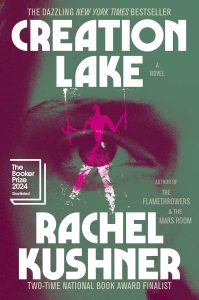I doubt there are many readers of “Creation Lake” who don’t pause in more than one section – perhaps in a passage about the values or Neanderthals vis a vis those of Homo sapiens – and wonder: What is going on here?” Or, “Why am I still reading this?”

Just such questions caused me to abandon “Creation Lake” at page 175, but the next morning, I read ahead a couple of more pages and became entranced by a lengthy antidote about a French boy named Bruno who, during World War II, finds a dead German soldier. Bruno grabs the soldier’s helmet, puts it on his head, and unwittingly infects himself with the dead man’s lice. His grandmother tries to kill the lice with kerosene, which damages his vision. The boy matures to be one France’s leading radical activists, and now, as an old man, he is the visionary for a nascent group of eco-terrorists.
It is this communal band, Le Moulin, and the freelance American spy, former FBI agent Sadie Smith, hired to disrupt them, around which “Creation Lake” revolves (and sometimes wobbles). There are several interwoven plots – the spy game, Sadie’s search for self-identity (which has gone missing after years of working undercover), and Bruno’s Aristotelian musings on love, war, politics, the purpose of life itself, and the aforementioned stages of hominin development, all fo which emerge from the cave where his retreat from late capitalism has taken him.
Sounds heavy, right? But it’s not if you approach “Creation Lake” as I did after my brief departure on page 175 – not as a novel, but as a journal in which entry, while mutually connected by strands either obvious or diaphanous, is complete unto itself. That perspective enables you to pass through the more maddening moments unperturbed and enjoy what the New York Times, in its gushing review, calls Kushner’s “floor-level interest in humanity,” meaning she doesn’t miss a tic or a trick of our post-evolutionary habits.
So, yes, amid Bruno’s philosophizing, Sadie’s searching, and the I-spying, there is fun amid the complexity. For the most part, I found “Creation Lake” engaging, entertaining and, even, thought-provoking. Yes, it is uneven, but all journals are.
